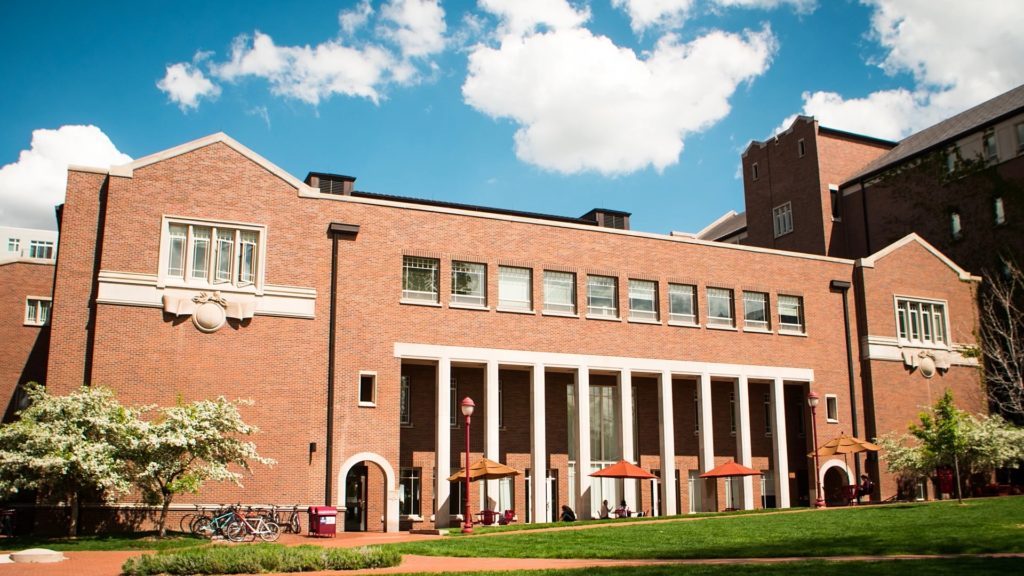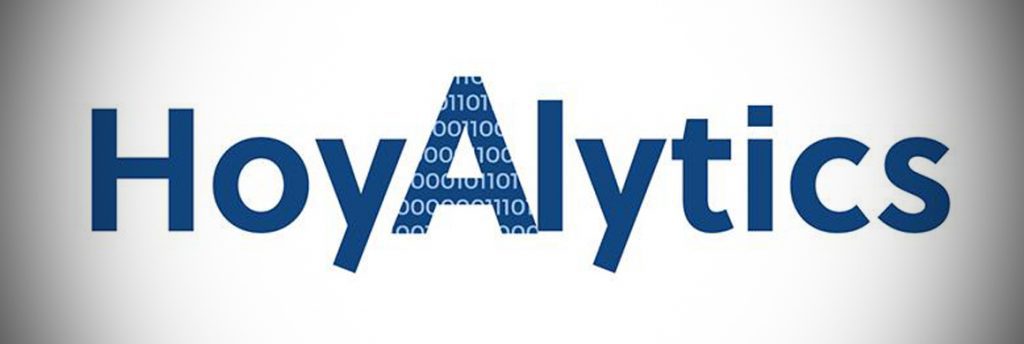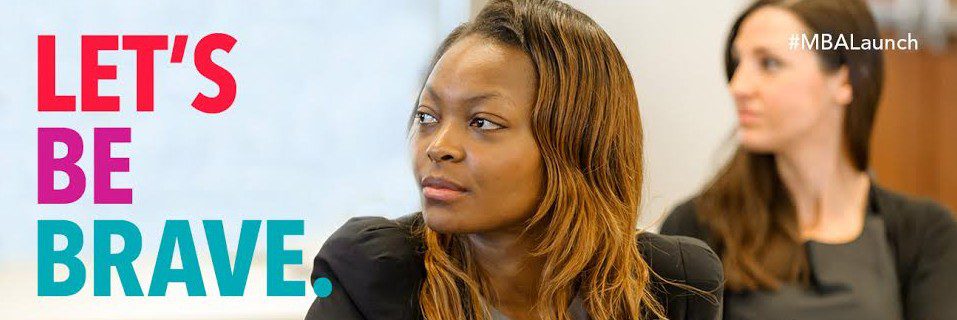If you are thinking about taking the GMAT or want to learn more about Veritas Prep’s GMAT courses, register to attend a one-hour seminar hosted by Veritas Prep’s course co-creator. This seminar will show you what to expect from the GMAT and how to conquer the exam.
Search results for :
Ivey MBA Graduates Making Big Wins in the World of Hockey
MBA graduates from the Ivey Business School at Western University Canada, alongside other business alumni from the university, are making big wins in the world of sports.
From the intense academic experience inside Ivey classrooms to international study trips and strong alumni networks, graduates of Ivey’s many business programs, including their MBA degree, are changing the game for hockey in Canada and across the world.
Not every MBA’s success in hockey is even relegated to work off the ice. For Dave Barrett, MBA ’04 and PhD ’14, who helped coach the Western Mustangs Women’s hockey team to a championship title in 2015, there are many similarities between coaching players on the ice and priming students for business success.
“Shaping the environment that they work in and what they think about themselves is a lot of what we do here at Ivey,” Barrett comments. “It’s creating that culture—you bring good hockey players in and you have to shape them into a unified force. It’s the same here, too.”
Other major players from Ivey are finding ways to connect their love of business with a passion for hockey. Karin Adams, HBA ’06 and MBA ’14, has allowed her passion to lead her to a career in the Total Rewards department of the Maple Leaf Sports & Entertainment company. As Senior Director of the department, Adams is responsible for building a compelling employee value proposition for employees company-wide.
“As we continue to grow the breadth of our portfolio, it has different demands on the talent needs the organization has,” Adams says. “It changes where we need to be looking for talent and what we are doing in order to recruit and retain them.”
In addition to the MBA alumni, Ivey graduates of the HBA and MSc department can also be found making an impact in the world of hockey. Among them are John Chayka, the 28-year old General Manager of the Arizona Coyotes, HBA ’14, who was hailed as “one of the NHL’s 10 smartest off-ice hirings of the 2015 off-season,” and Dario Zulich, HBA ’86, who plans to use hockey to rebuild tourism and revitalize the community of Greater Sudbury.
Columbia Business School Announces New M.S. in Business Analytics Degree
Columbia Business School (CBS), together with Columbia Engineering, yesterday announced a new full-time Master of Science in Business Analytics degree. Distinct from CBS’s MBA degree, the new program features a three-semester curriculum and is really geared toward students who want to learn the modeling techniques and data science tools that help businesses use data to influence decision making. A unique capstone project will serve as a key element of the new program, through which students will work with actual clients and relevant data sets to put the skills they’ve learned to work helping solve those companies’ real-world business problems. The capstone course will extend over the full three semesters of the program.
The program was developed jointly by faculty at both CBS and Columbia Engineering, and the resulting curriculum is designed to prepare graduates to excel in careers both as consulting analysts and associates and as business analysts and data scientists in fields including financial and professional services, technology, advertising and media, and other professions that require both a deep understanding and practical application of data analytics.
“By tapping into the vibrant and diverse business ecosystem that can only be found in New York, Columbia Business School and Columbia Engineering are uniquely situated to offer this new Master’s degree,” CBS Dean Glenn Hubbard said in a statement. “We see this as a must-do program for any future business person who wants to have a leg up in using data to make informed business decisions.”
CBS Enters an Already Crowded Field
Columbia is far from the first to announce a new data analytics master’s program—and it likely won’t be the last. It joins a long and growing list of other leading business schools that have sensed demand from both students and recruiters for programs that marry some of the skill sets of the MBA with the deeper study of data science and analytics that engineering faculty can provide.
MIT Sloan School of Management last year launched its own Master of Business Analytics (MBAn) degree, with leadership and support from the MIT Operations Research Center. In just one year, applications to the program have more than doubled—from 300 to 800—making the degree the most competitive at the school, with an admissions rate of less than 4 percent, the school reports. And just last month Sloan unveiled a new Business Analytics Certificate program that will be open to students in all MIT masters-level programs who want more rigorous academic content focused on data science.
Not to be left out, last month the University of Virginia’s Darden School of Business announced the launch of a new MBA+MSDS dual-degree program, which grants a Master of Data Science degree from UVA’s Data Science Institute and an MBA from Darden in 24 months (tuition for the MBA+MSDA program is the sum of each individual program’s standalone tuition). The program welcomed a pilot cohort this past summer, and Darden is currently accepting applications for the full program, which will launch in 2018.
NYU Stern, for its part, is now accepting applications for the inaugural class of a new specialized one-year Tech MBA, first announced last spring. And just yesterday Stern shared that an $8 million alumni gift will fund creation of a new center for technology, business, and innovation.
YOU MIGHT ALSO LIKE: More Business Schools Training MBA Students for Careers in Tech
Harvard Business School (HBS), too, sees where the action’s at and doesn’t intend to sit idly on the sidelines. In August 2017—together with the Harvard John A. Paulson School of Engineering and Applied Sciences and the Faculty of Arts and Sciences—HBS announced a partnership with 2U, Inc. to deliver a new online certificate program in business analytics. Expected to welcome its first cohort of students in March 2018, the Harvard Business Analytics Certificate Program is designed to help business leaders—including MBA grads—keep up with and leverage the explosion of data now available in every industry.
Some Schools Were Out in Front
Of course, amid this recent flurry of activity to enhance academic offerings at the intersection of technology and business, some schools can claim clear first-mover advantage. MBA students at CMU’s Tepper School of Business can opt to pursue a Technology Leadership MBA Track, a joint partnership between the Tepper School and Carnegie Mellon’s top-ranked School of Computer Science—indeed, it is one of the most popular offerings in the MBA program. Tepper also offers a three-year, dual-degree MBA/Master of Software Engineering program, also in partnership with the School of Computer Science.
And Stanford Graduate School of Business has for several years offered its students the opportunity to pursue a dual degree of significant relevance to students interested in careers in tech. Its joint MA in Computer Science/MBA degree links two of the university’s world-class programs and helps students develop a unique skill set ideal for becoming a manager and/or entrepreneur for new technology ventures. Stanford’s program includes a year of courses at each the GSB and in the Computer Science department followed by a third year of elective courses in both programs, enabling students to shave off one to two semesters it would take to complete both degrees separately.
RELATED: Best Business Schools to Jumpstart Your Career in Tech—Or Advance It
It Only Makes Sense
Whether beginning several years ago or just getting off the ground now, that business schools are recognizing and responding to market demand for business fundamentals married with data science know-how makes complete sense.
“The role of analytics has grown increasingly critical for most sectors of the economy,” Columbia Engineering Dean Mary C. Boyce said in a press release. “Our partnership with Columbia Business School combines our strength in data science, optimization, stochastic modeling, and analytics with their strength in data-driven decision-making for business and marketing to create a rigorous new master’s degree program.”
What Sets Columbia’s New Program Apart?
So what sets the newest program announced yesterday by Columbia apart from others in a crowded field? One distinguishing feature of the M.S. in Business Analytics is the capstone project that will put students to work on real-life consulting projects with companies using the companies’ own data, the school argues. “By working on real-world consulting projects, with real-world data, students will use the modeling techniques and data science tools to provide pragmatic solutions to the practical problems that businesses are facing today,” Costis Maglaras, professor and chair of CBS’s Decision, Risk & Operations Division, said in a press release.
Students in the new Columbia Business analytics degree program will also have valuable access to dedicated career placement services, the school notes, starting with completing a required Professional Development and Leadership course. “The M.S. in Business Analytics combines classroom instruction by distinguished Columbia professors with the experience of working on real-world problems via the capstone project course,” Columbia Engineering Professor Garud Iyengar said in the press release. “We expect this program to have 100 percent placement of its graduates as do our very successful M.S. in Management Science and Engineering and M.S. in Financial Engineering programs.”
Applications are currently being accepted for the first cohort of this new M.S. in Business Analytics. Students can choose to complete the program in one year by taking a summer semester or can take three non-contiguous semesters (fall, spring, fall), which would reserve the possibility of a summer internship.
For more information about the new Columbia M.S. in Business Analytics, click here.
This article has been edited and republished with permissions from our sister site, Clear Admit.
Hot Jobs for MBAs: Becoming a Pricing Analyst
MBA graduates looking to apply their skills to a fast-growing and high-paying career may be interested in pursuing a role in Pricing Analysis. Named among the 100 best jobs in America by CNN, working as a Pricing Analyst is a perfect way for an MBA graduate to make use of their strong education combining skills in marketing, finance, and analytics.
With a predicted 10-year job growth of 41.2 percent and roughly 280,000 total jobs available, business students who think they might be interested this fast-growing career can start preparing while still in school through specialized study in marketing or finance. Armed with the special skills in data analysis in addition to the strong business background of an MBA, students looking to enter the field after graduation will have a competitive advantage as they begin their career.
We’ve rounded up the most important things to know about a career in Pricing Analysis to help you decide if it’s the right role for you.
What is a Pricing Analyst?
A company’s pricing analyst is responsible for figuring out the appropriate price for a business to place on a product or service. Using a variety of data and different metrics, the Pricing Analyst will determine the perfect price that will both appeal to consumers and produce an appropriate profit for the company.
Pricing Analysts must be able to track marketplace trends and implement a strategy that will benefit both the company and consumer. Someone in this role must be able to effectively communicate to a number of other departments such as supply chain, sales, marketing, finance, and be able to work with these groups in making pricing recommendations and decisions based on their analysis.
Pricing Analysts may be needed at wide variety of companies and organizations, ranging from construction companies, colleges and universities, banks and financial institutions, pharmaceutical companies, and more.
What Skills Does a Pricing Analyst Need?
Those who succeed in the role of Pricing Analyst typically have strong skills in mathematics, analytical thinking and problem solving. It is also important that Pricing Analysts are able to effectively communicate, as they are often required to explain their research and analysis to others in order to make important decisions.
Other skills employers may seek in a Pricing Analyst may be:
- An interest and skill working with numbers and data.
- Being a detail oriented and proactive worker.
- Have the ability to work with minimal supervision.
- Experience in back-office and billing systems and database management programs,
Pricing Analyst Salary
Pricing Analyst salaries, according to PayScale, may vary according to a number of factors, such as education, terms of the job, and type of employer. On average, Pricing Analysts can earn anywhere from $52,000-61,000 depending on their level of experience. In cities like New York and Boston, that number is slightly higher.
A recent study from Deloitte found even more impressive figures: 62 percent of respondents in a survey of pricing professionals reported salaries of greater than $100,000 and 83 percent of respondents said they were also eligible for an annual bonus.
EVEN MORE MBA JOBS: Verizon is on the Lookout for MBA Students and Grads
MBAs For Pricing Analysts
While most MBA programs do not offer a direct concentration in pricing analysis, a number of programs still provide specialized pricing education through other departments, like finance and business analytics. Below are just a few examples of pricing-related courses available at some of the top MBA programs in the country:
-
Scheller College of Business – Georgia Institute of Technology
The Scheller College of Business offers a course in pricing strategy as part of their Business Analytics MBA concentration. The course, marketing Analytics and Pricing Strategy, helps students gain skills in making effective pricing decisions through the understanding of important economic and analytical concepts associated with customer behavior and competition.
-
The Wharton School – University of Pennsylvania
FNCE717, or Financial Derivatives, at the Wharton School focuses students on making strategic corporate decisions, particularly when it comes to pricing. Students will learn several different approaches to pricing and how to apply such skills for investment and risk-management.
-
Rutgers School of Business, Newark and New Brunswick
The MBA program at Rutgers’ Newark and New Brunswick location offers a class in Supply Chain Pricing Strategy. The course recognizes the importance of pricing in driving profits and the extreme negative impact poor pricing decisions can have. Students will learn how to approach pricing from both a strategic and tactical level and be able to apply it to a number of fields and industries.
Do You Actually Need an MBA for the Job?
While an MBA is not necessarily a requirement of all Pricing Analyst jobs, it is by far the most common degree held by those in this role. According to the aforementioned Deloitte survey, 43 percent of respondents held MBA degrees, while just 26 percent—the next highest percentage—held undergraduate degrees in business. Earning an MBA and demonstrating specialized coursework in pricing will give those in the field a competitive edge and open the door to higher level management positions in the field.
Supply Chain Management MBAs: The Best New York Programs
Product outsourcing is a hot topic today. Consequently, the supply chain management field is richer, more complex, and more necessary than ever. Optimizing the process of turning a concept into a product and getting that product to the shelf is integral to the success any retailer. No matter where a product is made, the progression from conception to end user is a collaborative effort. An MBA in supply chain management can help you learn who to contact and how to strategize in order to best serve both retailers and consumers.
New York City is among the retail capitals of the world. Schools in the New York metro have easy access to hundreds of CEO speakers, as well as a deluge of internship and job opportunities. Below, we’ve outlined some of our favorites.
The Best NYC Supply Chain Management MBA Programs
Columbia Business School
Though Columbia Business School does not offer concentrations, it would be remiss not to mention this academic powerhouse when considering programs with resources in supply chain management education. Columbia’s supply chain management courses are taught by extraordinarily well-regarded professors, who may serve as resources for students throughout their time at the school. Medini R. Singh, for example, is a sought-after professor. In addition to his 25+ years of teaching experience and numerous teaching awards, Singh serves on the advisory board for the W. Edwards Deming Center for Quality, Productivity, and Competitiveness. According to his bio, Singh’s research focuses on “service and supply chain design, at both the tactical and strategic level.” Singh has also consulted for multiple Fortune 500 companies. Columbia students MBAs will also have access to Awi Federgruen, the Charles E. Exley Professor of Management and Chair of the Decision, Risk and Operations Division of Columbia Business School. Federgruen has published over 120 pieces on the financial services industry, and often consults on supply chain management issues for large corporations.
Rutgers Business School, Newark and New Brunswick
Rutgers Business School offers a Supply Chain Management MBA, the mission of which, according to the website, is to “prepare students to meet and exceed the expectations of the employees experiencing a growing demand for supply chain management and logistics experts.” In fact, the school’s Supply Chain Management program was ranked eleventh on U.S. News & World Report’s 2016 list of best graduate schools for business. This ranking seems apt, considering a whopping 100 percent of the supply chain management MBA students from the class of 2016 were employed within 90 days of graduation. Students of this program have gone on to work various supply chain management jobs at companies like Este Lauder, Colgate, and Johnson & Johnson.
CHECK THIS OUT: Looking At New York City’s Best MBA Return on Investment (Pt. I)
Stern School of Business—New York University
The renowned New York University Stern School of Business provides students with the option of choosing a Supply Chain Management and Global Sourcing Concentration to equip MBAs to navigate supply chain issues in a global economy. Students who pursue this concentration can take classes like Global Sourcing and Open Innovation, Pricing Strategies, and Building and Managing Customer Relationships. Stern gears the specialization toward students aiming to pursue careers in management consulting, managing information systems, product management, and supply chain management. Students in this program can choose two of three core supply chain management courses, and then must take six of the 24 related elective courses.
Gabelli School of Business—Fordham University
The Gabelli School of Business at Fordham University offers many classes that specialize in supply chain management, including Operations Management. Under chair Sarah Jinhui Wu, the Gabelli Operations Management courses “equip students with a solid understanding of core operations concepts and decisions, rigorous analytical thinking and skills, and a creative mindset so they can deal with all of the complex issues of a supply chain.”
Many of the other concentrations offered in the Gabelli School of Business MBA program also offer courses revolving around supply chain management, including Global Sustainability.
Tuition Cost vs. Starting Salary: Atlanta
One of the most important things a prospective MBA can look for when choosing a business school is the program’s return on investment. Return on investment, or ROI, is the most common profitability ratio, and an easy way to determine if an MBA is “worth” your time and money.
According to a recent review of 129 schools from U.S. News & World Report, graduates from a third of the institutions earned an average starting salary and bonus of more than $100,000, with the overall average for all schools coming in at $91,940. MBA Class of 2015 graduates typically left school with just over $50,054 in debt, according to the same data.
Most business schools publish employment records with average salaries for different industries, so prospective MBA students can use these numbers to project future salaries. Lucky for you, we’ve compiled these figures some of the Atlanta metro‘s premiere business schools.
The Atlanta MBA Return on Investment
Clark Atlanta University School of Business
A full-time MBA at the Clark Atlanta School of Business requires 60 credit hours of study, which totals up to $53,220 in tuition. Other costs also apply, including $1,008 in annual fees as well as books and supplies. To save some money for sibling students, Clark offers a Sibling Discount to a biological or legally adopted sibling currently enrolled at Clark Atlanta University. Siblings will receive a 33.3 percent discount after submitting a copy of both birth certificates, parent’s federal tax return and a simple application.
According to employment statistics provided by the school, MBA graduates earn an average base salary of $79,000 with a signing bonus of $12,250. Most graduates took marketing/sales jobs (59.7 percent), with finance/accounting (29.7 percent), human resources (7.4 percent), and operations (7.4 percent) following behind. In order to help place MBAs, the Atlanta University Center Consortium Career Planning and Placement Service (AUCC CPPS) offers students career planning and placement resources, plans on-campus recruiting events and hosts a database of contact information for over 1400 corporate, government and educational partners. They also host several on-campus recruiting sessions and career fairs.
Eugene W. Stetson School of Business & Economics – Mercer University
Full-time MBAs at Mercer’s Eugene W. Stetson School of Business & Economics pay $818 per credit hour, with total tuition for the program coming to $29,448 with some additional minimal costs, such as a technology fee. Students can visit the university’s Office of Student Financial Planning to receive updated financial assistance information, including information on federal student loan programs.
According to U.S. News, Mercer MBAs earn an average base salary of $57,500, with 23.8 percent of full-time graduates employed at the time of graduation. Mercer students can visit the Office of Career Management Services on the Macon or Atlanta Campus to receive specialized career guidance, job search, internship search, résumé and cover letter assistance, developing personal brand information, interviewing information, and salary negotiating.
Goizueta Business School – Emory University
Students enrolled in Emory University’s Goizueta Business School two-year, full-time MBA program pay a base tuition of $59,000 per year, while those enrolled in the one-year program pay about $89,500. These cost account for tuition only, so students must consider additional expenses for textbooks and other fees. To offset some of these costs, financial assistance is available in the form of Federal Stafford Loans, graduate plus loans, private loans, international student loans, research and assistantships, merit-based scholarships, fellowships from the Goizueta Business Fund for Excellence and fellowships at various constituent centers.
According to Goizueta’s most recent MBA employment report, the school’s alumni are among the top for post-graduate employment nationwide, with nearly 95 percent of students receiving job offers within three months after graduating and an average full-time base salary of $113,295. Goizueta Business School’s Career Management Center (CMC) offers assistance to full-time MBAs in their job search. Students can receive professional development and interview training within both core and elective courses, preparing students for both the internship and job search processes. Most Emory MBAs were offered post-graduate employment following an internship (56 percent), with another 19 percent getting job offers thanks to School Scheduled Interviews.
YOU MAY ALSO LIKE: How To Avoid Costly MBA Résumé Mistakes
Scheller College of Business – Georgia Institute of Technology
Tuition costs for Georgia Tech Scheller College of Business full-time MBA students are about $29,232 a year for Georgia residents or $40,180 a year for out-of-state residents, as well as $2,010 in mandatory fees. Financial assistance is available in the form of federal loans, graduate assistantships, and a limited number of fellowships.
According to the school’s MBA Compensation Overview, 95 percent of Scheller MBAs are employed within three months of graduation. These students are paid an average starting salary of $108,088. Meanwhile, 90 percent of graduates earn a signing bonus, which average to the amount of $15,830. Scheller MBA students are guided along the path to employment at the Jones MBA Career Center, where they learn about opportunities for internships and employment through one-on-one advisement, an eight-week career development workshop, self-assessment tools, interview preparation, and a series of conferences and career fairs
Terry College of Business – University of Georgia
Terrt’s in-state students pay about $15,670 in annual tuition, including student fees, for the Terry College of Business‘ full-time MBA. Non-residents pay $34,378 per year, including student fees. The school also awards approximately one-third of its students with graduate assistantships to help make the program even more affordable. Some students may have their tuition drastically reduced per semester, get 40 percent of their student health insurance premiums paid by UGS, and receive a monthly stipend for working 13 hours per week in the Terry College of Business. Additional scholarships are also available, such as the Terry MBA Leadership Scholarship. Given out during the spring semester, the scholarship awards between $1,000 to $2,000 to a student who has shown promising leadership skills.
According to the school’s MBA Employment Statistics, 90 percent of University of Georgia full-time MBA students receive a job offer within three months of graduating with an averaging starting salary near $90,250. Terry helps its students gain employment at the MBA Career Management Center (CMC), which helps students and graduates connect with networking events, information sessions, interviews, and much more.
Top MBA Programs Gain Ground for Gender Parity
The Forté Foundation today released its annual women’s enrollment report for full-time MBA programs at its member schools, which include many of the top business schools in the United States and abroad. This fall, women’s MBA enrollment climbed to a global average of 37.4 percent, up 4 percent over 2013 figures, when the global average was 33.4 percent women.
In fact, the last five years of enrollment data at Forté member schools reveal steady gains in the percentage of women. For U.S. schools, women’s enrollment reached 37.8 percent this fall, up from 37.1 percent in 2016, and 34 percent in 2013. And for schools outside the United States, the gains have been even greater. In fall 2017, non-U.S. Forté member schools enrolled 36 percent women, up more than 3 percent year over year (from 32.8 percent in 2016) and almost five percent since fall 2013 (from 31.1 percent).
“I’m always heartened anytime I see a 1 percent trend overall,” Forté Executive Director Elissa Sangster told Clear Admit. “Year by year, it’s pretty significant for this group of schools to steadily have that same number increase—because it’s a lot of work to get more women into the pipeline and to matriculate those women,” she continued. “But this year, in particular, seeing those other schools outside the U.S. go up 3.4 percent in one year was very surprising.”
Two Schools Reach 45 Percent Women, Highest on Record
In fact, there were many signs beyond these overall statistics that show continuing progress toward gender parity among MBA programs. For one, 17 Forté member schools this fall enrolled 40 percent or more women—as compared to just two schools that reached this milestone in 2013. A total of 26 schools enrolled more than 35 percent women, more than twice as many as in 2013 (12 schools). Best yet, for the first time ever, two schools reached 45 percent or more women enrolled—the University of Pennsylvania’s Wharton School and George Washington University School of Business. And three more schools—two in the United States and one in the United Kingdom—were close behind at 44 percent.
“The 1 percent [overall year-over-year gain] may seem small, but we’re seeing 17 out of 50 schools hit over the 40 percent mark, and that’s huge,” said Sangster. “To start seeing schools trend that direction makes a big impact because it’s a hard thing to obtain for any school at this point.”
Not only that, the progress demonstrates that gender parity is attainable, Sangster stressed.
“Although women’s enrollment in business school is a slow and steady growth story, at this rate we could reach an average of 40 percent women’s enrollment in top business schools in less than five years and 50 percent by 2030,” she said in a Forté press release. “Why is this significant? There is evidence that an MBA can provide both career advancement and significant pay gains for women, giving them greater economic mobility. And efforts to support women to pursue an MBA can contribute to a more diverse leadership pipeline at companies.”
The Forté Foundation is a non-profit consortium of top business schools, corporations, and the Graduate Management Admission Council, and its efforts to move the needle toward gender parity in the MBA and business more generally are widespread. Launched in 2001 after the results of a landmark research study, Women and the MBA: Gateway to Opportunity, Forté now has 51 member schools: 39 in the United States, four in Canada, and eight in Europe. It also has numerous initiatives to help close the gender gap.
“Our college efforts are very robust and have been growing over the last five years. We are connecting with women about their career options and bringing the MBA into the conversation early,” explained Sangster. “It’s important for women in their university years to really understand what type of opportunities they have, to have access to role models, and to know the landscape of what’s to come. I think Forté can be a real guide in that. We know that having those conversations with young women is critical.”
A few of Forté’s initiatives include
- The annual Forté MBA Women’s Leadership Conference, which brings together hundreds of women MBA students and top companies each year to help attendees explore career paths, meet recruiters and mentors, and hear from influential businesswomen;
- The Forté College to Business Leadership Conference, a similar event designed to introduce undergraduate women to career opportunities and summer internships at top companies;
- The “Rising Star” pilot initiative, launched in September 2015, which helps undergraduate women become well-informed about their many career options, and
- MBALaunch, a hands-on, 10-month program that provides guidance, resources, and ongoing feedback about the business school application process through monthly webinars, peer group meetings, and feedback from experienced advisors.
“MBALaunch allows us to give women unprecedented access to business schools, alumnae, admissions representatives, and admissions experts—and also to give them a cohort of like-minded women who can support them and encourage them through the business school application process,” Sangster said. In the past, many women went through the application process alone, she continued. “MBALaunch allows us to present the best version of those women candidates to business schools. That’s what makes a critical difference in terms of admission into your stretch business school.”
The Forté Foundation also awards a variety of scholarships through its Forté Fellows program. The program has exploded from just 33 inaugural scholarships awarded in 2003 to 1,300 scholarships awarded to the incoming Class of 2017 and another 1,100 scholarships awarded to second-year students in the Class of 2016. Overall, since 2003, Forté schools have awarded a staggering $142 million in scholarships to Forté Fellows.
It Takes an Entire Community Effort
To augment Forté’s initiatives, top business schools can continue to make progress on their own by keeping a steady eye on gender parity and getting the entire school involved in the process, said Sangster.
“The schools that are doing a great job at consistently keeping their numbers high have an entire community effort focused on the goal of gender parity,” Sangster said. “It’s not just the admissions team reviewing applications and making decisions. It’s the students enrolled in the school being actively involved in recruiting and matriculating those students. It’s the alums making phone calls and participating in local coffees or teas to talk about their own story and to reduce concerns about the investment that women will be making.”
“It’s not just one small group of people; it’s a team effort, a community effort,” she continued. “The schools that are maintaining their numbers and seeing a steady climb have a full-court press.”
So which schools are leading the way? The following 17 Forté member business schools have 40 percent or higher women’s enrollment:
- Alliance Manchester Business School
- Columbia Business School
- Dartmouth College (Tuck School of Business)
- George Washington University School of Business
- Harvard Business School
- Imperial College Business School
- Massachusetts Institute of Technology (Sloan School of Management)
- Northwestern University (Kellogg School of Management)
- University of California Berkeley (Haas School of Business)
- The University of Chicago (Booth School of Business)
- University of Michigan (Ross School of Business)
- University of Oxford (Saïd Business School)
- University of Pennsylvania (Wharton)
- The University of Texas at Austin (McCombs School of Business)
- University of Toronto (Rotman School of Management)
- Yale School of Management
- York University (Schulich School of Business
And the following nine schools have 35 percent or greater women’s enrollment:
- Arizona State University (W. P. Carey School of Business)
- HEC-Paris
- London Business School
- New York University (Stern School of Business)
- University of California – Los Angeles (Anderson School of Management)
- University of Cambridge (Judge Business School)
- University of Illinois Urbana–Champaign (Gies College of Business)
- University of Virginia (Darden School of Business)
- Washington University in St. Louis (Olin Business School)
To access the full Forté report, click here.
This article has been edited and republished with permissions from Clear Admit.
Toronto MBA Programs That Don’t Require Work Experience

It's true that most traditional full-time MBA programs look for candidates who have demonstrated leadership and success in professional positions. But, just as many MBA programs don't require the GRE or GMAT exams, many business schools are willing to consider applicants with limited or no prior professional experience.
MBA@Syracuse- Click to learn more from our partner!
MBA@Syracuse offers students everywhere access to the full-time MBA program from Syracuse University — with no need to relocate or put their careers on hold. Award-winning faculty teach MBA@Syracuse classes through a live, online platform, and graduates earn the same degree as on-campus students. The program can be completed in just 24 months, and GMAT waivers are available to qualified professionals. Application deadlines are approaching so contact now to learn more.
MBA and Innovation: Our 4 Favorite Denver Schools for Entrepreneurs
Colorado’s population and economy have been rapidly expanding in recent years. The Denver Post estimates that, by 2050, Colorado’s population could increase to 8.5 million people: a 64 percent increase from the current population of 5.5. The economic and population boom make Denver an ideal place to launch a business. Denver is also less than an hour from Boulder, a city Inc. Magazine refers to as “America’s Startup Capital.” All in all, Denver metro is starting to look like a no-brainer for budding entrepreneurs.
But turning an idea into a company involves making infinite difficult decisions about business issues and strategy. According to Forbes, 90 percent of start ups eventually fail. Earning an MBA means gaining access to business networks, knowledge, and resources, and it can be an excellent way to gain the edge you need in order to help your idea thrive. Below, we’ve laid out four of our favorite Denver MBA programs for entrepreneurs.
University of Denver – Daniels College of Business
Students who want to start a business would be remiss not to consider the University of Denver’s Daniels College of Business, which was recently listed among Inc. Magazine’s “15 Most Innovative MBA Programs.” Forbes also ranked University of Denver in the “Top 50 for Startups” as recently as 2014. Daniels grads have gone on to start their own companies, and to find creative ways to meet the needs of their community. Leo Osahor (MBA 2007, MSM 2007) developed FlightSpeak, the largest and most detailed airport app to date. The app allows travelers to view security wait times, shopping options and coupon offers, and WIFI info for 315 airports around the world. The school also helps sponsor an annual Pitch Competition that fosters entrepreneurship by allowing graduate and undergraduate students to present their company or product ideas to a panel of local business owners. Winners receive a $1,000 cash prize that lets them take steps toward bringing their ideas to fruition.


The Daniels College of Business/Photo via Daniels.edu
Colorado State University College of Business
The Colorado State University College of Business has an entire institute devoted to entrepreneurship. The Institute for Entrepreneurship offers several programs outside of the classroom that help budding entrepreneurs gain the insight and resources they need to embark on their business ventures. According to the school, the institute hosts annual events such as Women Entrepreneurs’ Leadership Summit, Venture Adventure Challenge, and the Distinguished Entrepreneur speaker series.
University of Colorado – Denver Business School
The University of Colorado’s Denver Business School MBA program provides the option of pursuing an entrepreneurship specialization. This specialization allows students to explore a breadth of topics including web development, personal branding, and social entrepreneurship. MBAs with this specialization devote 12 of their 15 elective credits to entrepreneurship-related courses. University of Colorado’s Jake Jabs Center for Entrepreneurship supplies students aiming to start their own business with additional resources, such as career coaching, networking, job recruitment, and internship opportunities.
University of Colorado, Boulder – Leeds School of Business
Students at the University of Colorado, Boulder’s Leeds School of Business will have no trouble accruing the knowledge and skills necessary to start their own business. Leeds students can pursue an MBA with an entrepreneurship focus. In fact, the school offers so many entrepreneurship electives, there are six sub-categories students can use to tailor their educational trajectory to their specific goals. Entrepreneurship MBAs can focus on New Venture Finance, Entrepreneurial Marketing, Entrepreneurial Practice, Sustainable and Social Entrepreneurship, Corporate Entrepreneurship, or New Venture Creation. Leeds School of Business has inspired innovators such as Brent Handler, the destination club pioneer who co-founded Exclusive Resorts.
Searching for the World’s Top MBA Recruiters: Comcast
Ever year, new MBA graduates are entering the workforce, and companies throughout the world seek new ways to benefit from their educational experience and knowledge. Major companies like the Comcast Corporation seek young professionals to contribute their talent to the company in a number of different ways.
Based in Philadelphia, PA, Comcast is a telecommunications conglomerate that has been taking over the globe since its founding fifty-four years ago in Tupelo, Mississippi. From internet provider to producers of feature films through the NBCUniversal (another one of our favorite MBA recruiters) division, Comcast has an expansive number of markets it can reach.
Today, Comcast makes more than $19.7 billion in media revenue, 88 percent of which comes from its NBCUniversal division. The remaining revenue comes from its cable business and from ownership of the streaming service Hulu. As of December 2016, Comcast employed 153,000 people among its various divisions. Ever looking to expand its reach, Comcast offers a number of opportunities for ambitious MBAs to gain experience and start careers at one of the world’s top media conglomerates.
Why Work at Comcast?
The appeal of working at a company like Comcast can be seen in the numbers: close to one million people have applied for a job at Comcast or one of its divisions every year since 2012. One reason may be the diversity in the kind of work one can do at the company—from creating new television shows to creating new apps and innovative products. With roughly 2,000 positions available at any given time, Comcast is always seeking passionate and entrepreneurial individuals who will help shape the company as it continues to grow and change.
Comcast also offers employees a number of opportunities to grow in their careers and at the company. Valuing teamwork, creativity and entrepreneurship, the company is always looking to empower individuals that represent these features and provide opportunities for them to use their talents in more ways.
Getting Started
Current MBAs looking to get their foot in the door at Comcast have a couple of different ways to do so. Students in the first year of their MBA program have the chance to pursue an internship at the company’s headquarters in Philadelphia. The preferred candidate for this specific internship would be between their first and second year of an MBA program, and have more than five years of professional work experience. Internship focuses for MBA students can occur in a wide variety of fields, including:
- HQ Functions
- Video Business Unit Strategy
- Internet Product Strategy
- Sales & Marketing
- Marketing Intelligence & Insights
- Corporate Strategy
- Integrated Talent Management
MBA students in their second year may also pursue a slot in Comcast’s MBA Rotational Leadership Program, which offers individualized placement into career-accelerating positions after a two-year rotational period. Students will have the ability to work on critical business projects in a variety of areas within Comcast and NBCUniversal, receive exposure to senior leadership through projects and development sessions, and gain access to mentorship through the programs cohort structure and interaction with peer advisors, mentors and program managers.
The ideal candidate for the MBA Rotational Leadership program has more than five years relevant work experience and a track record of academic excellence. The perfect MBA for this role must be a self starter, communicate effectively, and be passionate about innovation.
YOU MAY ALSO LIKE: Want To Work For NBCUniversal? An MBA Can Help
What Types of Jobs are Available?
MBA students and graduates applying for jobs at Comcast after earning their degree will find a number of opportunities available. Here are just a couple roles currently open for MBA students and graduates:
-
Director of Contracts Management — Technical Operations
The Director of Contracts management will be responsible for the drafting, evaluation, negotiation, and execution of all types of contracts. The director will monitor all contract work to ensure progress, assist in the training and development of a qualified frontline staff and manage the outsourcing of contract drafting and negotiations. The estimated salary for a Director of Contracts Management is between $98,000 and $144,000 per year, according to user statistics provided by Glassdoor.
-
Pricing Analyst
The role of Pricing Analyst at Comcast helps to provide insights to the finance and marketing departments to make decisions for pricing in the Comcast Business division. The person in this role will use business analysis to help gather data and create reports that can help provide business leaders with continued recommendation leaders. The role requires a deep understanding of operational processes, marketing strategy, and strong interpersonal communication abilities.
-
Senior Business Operations Manager
Currently open for applicants in the Philadelphia and New York City metro, the Senior Business Operations Manager role with FreeWheel, Comcast’s premium distribution advertising company, is part of the team “responsible for monitoring and providing insights into the health of the overall business.”
The role typically requires six or more years of professional experience and an MBA degree is preferred for the specific responsibilities of the position. According to user statistics provided by Glassdoor, Senior Business Operations Manager tend to make close to or more than six figures per year in the U.S.
-
Director, Strategic Analytics
This role, currently open in the Philadelphia metro, unsurprisingly requires a lengthy and comprehensive understanding of business analytics, down to requisite knowledge of tools like R, SAS, and SQL, as well as 10 or more years of professional experience in the fields of computer science, finance, marketing, statistics, economics, and other related fields. Like the Senior Business Operations Manager role mentioned above, an MBA degree is not explicitly required, but Comcast notes it is “strongly preferred” for the position.
Check out more of Comcast’s currently open positions for MBA students and graduates today.
Georgetown McDonough MBAs Launch HoyAnalytics Club
A group of Evening MBA students at the Georgetown University McDonough School of Business recently launched HoyAnalytics—a student organization focusing on statistics and data analytics. Though the club is is pending official sponsorship by the MBA Program Office, it has drawn a lot of interest in the McDonough School of Business.
According to the McDonough School, HoyAlytics is the first club organized by Evening MBA students. The organization’s board is made up of both full-time and Evening program students, and was created with unifying the two MBA programs in mind.
But the organization’s two main objectives are to create a community for those interested in statistics and analytics, as well as help those who are not already data-savvy gain quantitative skills. As statistics and analytics have become prevalent in more and more industries, HoyAlytics hopes to prepare MBAs for their careers.
“The club is on the cutting edge,” said Kenny Tan (MBA’19), one of the HoyAlytics founders. “Students are taking it in their own hands to make things happen.”


According to McDonough, the club recently held a free Excel workshop with nearly 40 full-time and Evening MBA students in attendance, and plans to continue holding workshops to teach different skills and software, such as Tableau, SAS, R, and SQL, as well as inviting guest speakers.
Student organizations and clubs generally provide great networking and professional benefits, such as access to industry leaders, professional development opportunities and the ability to make a real impact. A U.S. News & World Report list describes the following as reasons why it’s a good decision to get involved in a club in college:
- It allows students to become connected to their school
- It helps them build community
- It allows them to discover their passions and strengths
- It’s a résumé builder
- Sometimes, busier people do better
- Utilize your school’s resources
Check out some of the coolest MBA clubs and student organization’s in the Washington DC Metro here.
What Are The Highest Paid MBA Salaries in San Diego?
If you’re looking to take in the California sun but avoid the fast-paced and high-priced centers of Silicon Valley or Los Angeles, heading southward to San Diego may be the perfect place for an up-and-coming business professional. Recently named the eighth best big city to live in the U.S., based on livability, education, health, and a strong local economy, San Diego is increasingly becoming the perfect spot for business students looking to advance their education and start a career. Not only is San Diego the perfect spot for those breaking into well-established fields within business, but it has also been ranked by Forbes as the best city to start a new business in the U.S. Demonstrating heavy concentrations in areas that predict high growth combined with adaptability to new business methods and tech make San Diego the perfect place for young entrepreneurs to put their education to work.
Of course, a city can really only top the list for business students if it can offer quality educations and high-value degrees. In a state with a notoriously high cost of living, students thinking about pursuing a degree in San Diego will want to be sure their investment is worth it.
Thankfully, San Diego offers a number of quality business schools with graduates that are able to quickly turn their degree into a high salary and promising career. Let’s take a closer look at the business schools with the highest post-graduate salaries for MBAs in San Diego.
Rady School of Management – UC San Diego
According to the Rady School of Management at UC San Diego Class of 2017 Employment Report for full-time MBA graduates, the overall salary average for MBA students was $84,335, with a majority of graduates finding jobs in San Diego’s ever-emerging technology industry. Tech-based companies actively hiring recent Rady MBAs include Amazon, HP, IBM, and San Diego’s own Qualcomm Technologies, Inc, among others.
Not only are the post-MBA salaries high for Rady graduates, but so is the likelihood that graduates will secure a job. About 82 percent of graduates had secured a job within just three months of graduating, and 10 percent started their very own company—reflective of San Diego’s entrepreneurial environment.
University of San Diego School of Business Administration
The average salary for graduates from The University of San Diego School of Business Administration is $72,363, with a true range of salaries anywhere from $50,000 to $100,000 per year. Within just three months after graduation from the School of Business, 83 percent of MBA students would find employment, covering a wide range of industries from technology (40 percent) to consulting (20 percent) and consumer products (20 percent). Top companies such as Amazon, Deloitte, Intel, and Hewlett Packard have hired USD MBA graduates.
Fowler College of Business Administration – SDSU
The Fowler College of Business at San Diego State University also boasts some of the highest MBA salaries in San Diego. More than two-thirds of graduates from the full-time MBA program at Fowler would find jobs or promotions within three months after earning their MBA, with an average salary of $61,467. Graduates were spread through a number of industries and professional functions, the most significant percentage working in business development/sales and within the Technology/IT/Information Systems fields. Following graduation, Fowler students found jobs with some of the country’s top brands, such as The Gap Inc., GEICO, HSBC Group, and PepsiCo Inc.
For prospective MBA students looking to get paid out west, you can check out our overview of the highest paid MBA salaries in Los Angeles and San Francisco as well.
Tech Grads Surge in New Northwestern Kellogg Employment Report
The Kellogg School of Management released new employment data and statistics from the Class of 2017. According to the school, 94 percent of Kellogg’s full-time MBA Class of 2017 received an offer within three months of graduation.
“Kellogg leaders take a multidisciplinary approach to solving complex business challenges,” said Matt Merrick, Associate Dean of MBA Operations. “The versatile skills they hone at Kellogg enable them to make an immediate impact across all types of organizations.”
MBAs were hired by a wide variety of companies across all disciplines and industries, shapes and sizes. Some of the top companies hiring Kellogg students include McKinsey & Company, The Boston Consulting Group, Amazon, Bain & Company, and Microsoft.
Employment data shows that the most popular industries were consulting (33 percent), technology (25 percent), finance (13 percent) and CPG (12 percent). The Kellogg Career Management Center helped students establish relationships with more than 50 technology companies in order to help secure these employment opportunities. Overall, the Career Management Center works with employers to create custom recruiting strategies, forging deep relationships with employers of all sizes, from all industries and regions.
According to our sister site Clear Admit, the 25 percent of Kellogg grads that landed jobs in the technology industry was a school record.
Jeanette Brown writes:
“Amazon hired 32 Kellogg grads, making it the third largest recruiter in 2017, behind only McKinsey and Boston Consulting Group (BCG). But Amazon was far from the only tech firm to hire at the school. ‘It’s not only the big employers like Amazon, Apple, Google—but the small companies as well, the ones that hire just one to two MBAs,’ explains Liza Kirkpatrick, Senior Director of the full-time MBA program at Kellogg’s Career Management Center. ‘We had over 50 unique tech employers that hired our students this past year, which demonstrates that we really have that depth.’ Kirkpatrick further noted that the types of jobs for which tech firms are hiring Kellogg grads is widely varied, including product management, sales, marketing, business operations, supply chain, product development, and others.”
Kirkpatrick notes that the surge in tech jobs stems from a concerted effort from the business school, which was also reflected in the number of technology industry internships for the Class of 2018.
“‘We started developing relationships in the tech space many years ago,’ acknowledges Kirkpatrick. ‘It has taken a while for firms to recognize that when an MBA comes on board, it really adds value.’ But they certainly have, which can also be seen reflected in the number of tech firms that now take on summer interns. ‘They have really organized themselves to bring on an MBA class as interns as a result,’ Kirkpatrick adds. The most recent employment report reveals that 26 percent of the Class of 2018 interned at technology firms.”
In a press release from the school, Jodi Washington, a Program Manager for the Networking and Security Transformation team, said, “Kellogg’s curriculum builds leaders who are strong analytical thinkers and are confident collaborating across organizations. The Kellogg graduates we hire jump in on day one, but also continue to mature at Cisco.”


2017 statistics/photo courtesy of Northwestern Kellogg.
The statistics show that the number of Kellogg MBAs to accept job offers on the West Coast has also increased (31.4 percent) from last year, a direct correlation to uptick in tech hires. Meanwhile, 30 percent of 2017 MBAs stayed in the Midwest and 33 percent accepted jobs on the East Coast.
You can read more on Kellogg’s latest employment stats and the Clear Admit interview with Kellogg Senior Director of Career Management Liza Kirkpatrick here.
What Is The Worst MBA Advice You Have Ever Heard?
The path to business school is paved with experts and know-nothing-know-it-alls alike—it’s just hard to tell the difference sometimes.
This is especially true when it comes to “dos” and “don’ts” of the trade. You’re bound to encounter confusing, conflicting, or just plain bad advice in any field but there’s something about business school that seems to attract meaningless jargon like flies to honey.
I spoke to Accepted’s Linda Abraham and North Star Admissions’ Karen Marks, two leading admissions counselors and bonafide MBA experts, about the eight worst pieces of advice most commonly doled out to MBAs-to-be.
“Tell them what they want to hear.”
“The admissions committee will see through it, the applicant will blend into the gray mass of applicants who are making the same mistake, and at competitive schools, will get dinged,” Abraham writes. “Telling schools what you think they want to hear means telling them what you don’t know, and it also means you’re not telling them what you want them to know.”
“If you are waitlisted, ignore the school’s directions and make a dramatic gesture to demonstrate your interest.”
According to Marks, “People … have been known to do everything from emailing the admissions office once a day (relatively benign, but inappropriate) to sending homemade gifts (creepy) to showing up in the admissions office and refusing to leave until they have spoken with the Dean. All of this backfires, it’s really important to listen to the school’s directions and express your interest in ways that underscore your ability to follow directions, and your understanding of the culture.”
“Change your career goals and personal story for each school.”
Marks explains, “Your goals and core narrative should remain constant, no matter what school you are applying to. Don’t tell Stanford that you want to work in micro-finance and Kellogg that you dream of marketing, just because you think it’s what they want to hear.”
Abraham recalls an interaction she had with “an applicant who came to us initially for Rejection Review.” This applicant was told by his consultant, a former Yale SOM adcom director, “she would have rejected him also because the applicant’s goal made no sense given his work experience, education and extra-curricular activities. He explained that his friends had told him to use the “hot” goal that year, so he used it in his application. Next year he applied with an authentic goal (and app) and was accepted to an M7 school.”
“You have no chance of getting into a top MBA program because you didn’t go to a top undergrad.”
Abraham couldn’t disagree more with this statement.
“If an applicant excelled at their local college, shows leadership, and has had an impactful career, and has a competitive test score, they have a chance at elite MBA programs,” she says.
“You have a 750-plus GMAT and a 3.9 GPA, you’re in anywhere.”
Both counselors call hogwash on this one.
“You can’t rest on academic laurels. Yes, those numbers are very attractive to top b-schools, but if they are combined with arrogance—forget it. Schools also want to see leadership and impact in their accepted students. So, if Super Student wasn’t a super employee or entrepreneur or campus community member, those stats do not guarantee acceptance at top MBA programs.”
“Your goals don’t really matter, because you’re likely to change them once at b-school.”
Abraham writes, “Yes, your goals are likely to change and schools know that, but they at least want you to start their program with direction and a goal they know they can help you achieve. Goals are a major component in fit at most top MBA programs. And if yours are vague or don’t match the strengths of your target schools, then you simply aren’t showing fit.”
“If you have a blind interview, you can wing it.”
“You can wing it. BUT you are unlikely to be as effective as the other applicants who prepare,” Abraham notes.
“They will have researched the school, know exactly why they want to attend this program, and mined their own experiences and achievements so they are ready to show they belong at the interviewing school and will contribute to the school’s student body and alumni network.”
“Oh, and they also have thoughtful questions to ask the interviewer.”
“You won’t get in if your numbers are below an arbitrary number, so don’t even bother applying.”
Abraham has worked with “multiple clients who had extremely low GMATs and GPAs, below 2.5 and below 600, who have been admitted to Wharton, Booth, HBS, etc. I also admitted applicants with weak numeric profiles to Tuck when I was the Associate Director of Admissions. (They had other stellar qualities).”
Abraham believes that “essays, personality, perspective and life experience are more important than numbers.” She adds, “Application reviews are comprehensive. One element is extremely unlikely to keep you out or carry you across the threshold of a dream MBA program.”
How Philadelphia MBA Programs Help Lower-Income Applicants
Compared to Philly’s east coast metropolitan peers, its cost of living is laughably low. Additionally, Philly has all of the advantages of being located smack dab between DC and NYC. Although Wall Street has long since displaced Philly as the American center for banking, much of that infrastructure and tradition remain, which helps Philly maintain its status as a major economic powerhouse in the 21st century.
Since, according to Philly Mag, Philadelphia has one of the fastest growing millennial populations in the country, the city has creativity and energy that permeates every sector. All of these factors make Philly the perfect place to launch a career.
For low-income students looking to pursue an MBA in Philly, we’ve compiled a list of what some of Philly metro’s top schools are doing to help students fund their higher education.
Fox School of Business — Temple University
The Fox School of Business at Temple University has a variety of options for students looking to finance their MBA. In fact, according to the school’s website, 60 percent of first-year Temple students receive need-based aid each year. On average, first year students receiving need-based aid are awarded $15,000 toward tuition. Fox carefully assesses the applications of all incoming students, and the school distributes merit-based scholarships for those who demonstrate particular promise. There are also specific financial perks for Temple alumni coming into the MBA program. These students are not required to pay an application fee and receive a five percent tuition scholarship.
JUST FOR YOU: Fox Temple EMBA Jumps in New Financial Times Ranking
Lehigh University College of Business and Economics
The Lehigh University College of Business and Economics provides a some merit-based scholarships to helps students fund their education. Awards are determined by the Committee on Financial aid. The committee considers an applicant’s undergraduate record, test scores, and work experience. Scholarships include the Dean’s Scholar, which offers extremely promising students a full ride plus a $10,000 living stipend.
Lehigh also has a number of Director’s Scholars, who may receive awards anywhere from $5,00 to full tuition. Lehigh offers many other scholarships in addition to need-based financial aid specific that varies depending on the MBA track.
LeBow College of Business — Drexel University
When considering Philly Metro MBA programs that provide resources for low-income applicants, it would be remiss not to mention Drexel’s LeBow College of Business. At LeBow, an impressive 82 percent of full-time MBAs get aid that amounts to 62 percent of tuition. Additionally, nearly 70 percent of full-time students benefit from grants that covered about one fifth their tuition. Drexel also offers merit-based scholarships. Additionally, the school offers the URM Scholarship, which offers supplemental fiscal gifts to underrepresented minority students.
Smeal College of Business — Penn State University
Penn State’s Smeal College of Business has a large number of MBA alumni-funded scholarships that are awarded based on academic achievement, work history, and how well students fit into the Smeal program. Around 20 percent of incoming students receive $5-10,000 awards. There are fellowships for specific groups of students, including the Powerful Women Paving the Way Fellowship which is awarded to promising women, and the Maimuna Mijindadi Anyone Memorial Fellowship, for students of Nigerian descent.
The Wharton School — University of Pennsylvania
Students who apply to Wharton are automatically considered for fellowships that offer some level of financial support. Students also have the option of applying to any of over 700 external fellowship programs. Wharton students can also apply for private or federal loans.
The Ivy League business school offers a litany of scholarship opportunities for incoming and current students, from the American Association of University Women, to the Instituto Ling Scholarship Program for international applicants, among others.
Additionally, Wharton hosts a positively booming array of fellowship opportunities, including some of MetroMBA’s favorites, like the Forte Fellowships program and the Reaching Out LGBT MBA Fellowship.
For more information on Wharton’s many financial assistance opportunities, click here.
Los Angeles MBA Programs that Specialize in Supply Chain Management
As businesses grow and develop, it’s up to supply chain managers, or SCMs, to effectively ensure that all goods and services are delivered in a quick, optimized manner.
SCMs are the logistical overlords of any major operation—they oversee how all the parts of their product, including raw materials, information, and finance, move from supplier, to manufacturer, to wholesaler, to retailer, and finally to the consumer.
As more and more MBA students and graduates find employment as SCMs, more business school have added courses and concentrations in supply chain management, including some top business schools in the Los Angeles metro.
If you’re a prospective MBA in the City of Angeles, take this deeper dive into these LA metro MBA programs.
The Best Los Angeles Supply Chain Management MBA Programs
Anderson School of Management – UCLA
While the UCLA Anderson School of Management doesn’t offer a concentration or major in supply chain management, related coursework is recommended for MBAs on the consulting specialization, including 240F – Supply Chain Management. The course is taught by Chris Tang, UCLA Distinguished Professor and Edward W. Carter Chair in Business Administration. Tang is a foremost scholar on supply chain management, having published more than 100 articles and five books.
The course explains how supply chains work and how to deal with many of their strategic and tactical challenges. Topics covered in the class include:
- Issues and opportunities brought by the Internet and the rise of e-business
- Instabilities caused by inadequate information-sharing
- Outsourcing
- Strategic alliances
Graziadio School of Business and Management – Pepperdine University
The Graziadio School of Business and Management offers not only one, but two specialized MBA programs that offer supply chain coursework: the Digital Innovation & Information Systems MBA and the Full-Time Applied Analytics MBA.
The Digital Innovation & Information Systems MBA is available to 15 and 20-Month MBA students and focuses on bridging the gap between business and technology. All electives in this program are offered in a blended learning format with one elective course scheduled per 7-week period and requires two Saturdays of on-campus class sessions at the West Los Angeles Graduate Campus, with the remaining coursework offered online. Related coursework includes DESC 634 – Supply Chain Management.
The Full-Time Applied Analytics MBA is an immersive program that prepares students through a core curriculum is built around Decision Sciences and Information Systems and Technology Management, with Global Business and elective course requirements to round out your education, such as DESC 627 – Supply Chain Management Analytics. The class places a strong emphasis on the development and use of analytics-based models to illustrate the underlying concepts involved in both intra-and inter-firm logistics operations.
YOU MAY ALSO LIKE: The Best Nonprofit MBA Programs in Los Angeles
Loyola Marymount University – College of Business Administration
The Loyola Marymount University College of Business Administration offers a Purchasing and Supply Chain Management Online Training Program. While not an MBA program or part of a graduate degree program, this online certificate program teaches fundamental aspects of the supply chain environment, including enterprise resource planning systems, requirement systems, interrelationships between purchasing, vendor selection, sources of supply, and more. This program is a good choice for those looking for project management experience.
Marshall School of Business – USC
Similarly to Marymount, the USC Marshall School of Business offers a graduate certificate program in Optimization and Supply Chain Management. Offered in partnership with the Viterbi School of Engineering, the program focuses on areas such as product introduction, strategic procurement, outsourcing, logistics and distribution, information technology and its role in managing global supply chains, and supply chain optimization. Units earned in the process of completing the certificate can usually be applied to an MBA degree and successful completion of the graduate certificate is documented on the graduate’s USC transcript and acknowledged with a certificate (diploma) issued by the University of Southern California.
Peter F. Drucker and Masatoshi Ito Graduate School of Management – Claremont Graduate University
The Peter F. Drucker and Masatoshi Ito Graduate School of Management offers supply chain management as an area of concentration for their MBA program. Students on this track explore concepts of supply chain management while learning to leverage technologies like big data, analytics, optimization, and geospatial systems.
Drucker is also home to the Center for Supply Chain & Logistics. After launching in 2015, the Center has partnered with business, government, trade, and policy leaders to enhance the performance of supply chains globally and the economic performance of the region. Partnership with companies like Toyota have created wonderful opportunities for students, such as the Toyota Women of Achievement Scholars program, which aims to create the future of supply chain by empowering women to take the lead in this vital field. The fellowship provides female scholars with a top notch education and formal mentor programs with other women leaders and career guidance to make the most of their degrees.
Online MBA Programs That Don’t Require the GMAT or GRE


Why Do Schools Require the GMAT?
Similar to how the SAT plays a role in undergraduate admission to higher education, the GMAT has been a consistent requirement for the majority of business programs globally. This standardized test has been one of a variety of factors that go into consideration when being accepted into programs. There are three main reasons that the GMAT has been part of the application process:
- Reliable indicator of student success: Based on surveys conducted by GMAC, the GMAT has been a reliable indicator of student success in the classroom among MBA programs.
- Equalizer in admission process to gauge quality of prospective students: The GMAT also provides a standardized test, which is applicable to all students entering admissions to top MBA programs. Other factors such as years of work experience and undergraduate GPA are subjective and can vary depending on the applicant.
- Major factor in many major MBA rankings: Major publication rankings such as the Financial Times, US News and BusinessWeek take into consideration the average GMAT score for each MBA programs incoming class. For example, the mean GMAT and GRE score is weighted at 0.1625% for the US News Ranking. Historically, schools have an incentive to accept students with higher GMAT scored for ranking purposes in these major publication rankings.
Why Pursue an Online MBA?
There are many reasons to pursue an online MBA degree versus a full-time on-site MBA or a part-time on-site MBA:
- Advancement in technology: The advancement in technology platforms, schools are increasingly able to provide an in-person atmosphere at remote locations for students. For example, many colleges utilize a web platform called ClassroomLIVE, which is an integrated, web-based learning environment that delivers programs in real-time from classrooms on college campus’s direct to students, in their homes, at their workplaces, or while traveling. This provides a synchronous learning opportunity where students are able to interact live with professors and other students during the class as it is taking place on campus. Take a look at an example of the interactive learning platform here.
- More accepted among employers: The stigma among corporate recruiters and hiring mangers when it came to online MBA job seekers was that it was not as respected compared to on-campus MBA offerings. However, with the online MBA becoming more popular among degree seekers, corporate recruiters and hiring managers are weighing the name of your college and the type of degree you have earned is more heavily than the method by which you earned your degree.
- Flexibility: One of the major issues facing MBA degree seekers is balancing their current career or family obligations while also being able to complete an MBA and the learning requirements. Many part-time programs are offered at specific locations on specific days, creating a barrier for applicants to pursue the degree offering. One of the major advantages of pursuing an online MBA program is the flexibility the learning experience offers. Many programs are beginning to offer students the option to attend the classroom learning in person, but not penalizing them for accessing the curriculum remotely.
- Lower cost on average: Since the overhead cost are lower for colleges and universities, online MBA programs are typically cheaper than on-site program offerings. This is another advantage for students who are looking to complete a flexible MBA degree at a lower cost. On average, online MBA programs are about 15-20% cheaper than an on-site offering due to the lower overhead.
What Factors Should I Consider for Choosing an Online MBA?
- Network of professors and faculty: The professors and faculty in your MBA program are one of the most important facilitators as you learn the curriculum of an MBA. Professors have in-depth knowledge of business practices as they apply to the real world and the best ones can challenge you to apply the skills you learn throughout your MBA to real-life scenarios to prepare you as a business professional. It is important to understand your professors background and experience and how it will impact their teaching style and expertise.
- Network in the classroom: Although professors and faculty will steer high-level learning, your classmates will have a large impact on your classroom discussions, projects and case studies. Learning from experienced individuals will provide more value and insight throughout your MBA. It is important to prioritize the level of quality among your classmates to enhance your learning experience during your online MBA.
- Alumni network: One of the most important assets an MBA program can provide is its inclusion to a wide range of alumni from CEO’s and CFO’s of Fortune 500 companies to presidents and general Managers of global corporations. It is important as you consider the quality of the MBA program, that you also heavily factor in the alumni network that each institution provides to its newly dubbed alumni. These networks open doors to employment and internship opportunities post-graduation.
- Internship opportunities: Many MBA programs offer internship opportunities during your educational experience. MBA internships allow you to get your foot in the door while directly applying the knowledge and skills you gained during your MBA. It is also important to research the career services office to see where previous MBA students have interned to make sure the opportunities fit your goals.
What are the General Requirements of Online MBA Programs that Do Not Require the GMAT?
For applicants who are looking to bypass the GMAT and pursue an MBA that does not require the GMAT, there still are requirements to be eligible for admissions to many online MBA programs, they include:
- Schools application
- Bachelor’s degree
- Resume
- Letters of Recommendation
- Personal Statement
- Application Fee
Why Pursue an Online MBA That Does Not Require the GMAT or Offers a GMAT Waiver?
One of the main reasons applicants should consider pursuing an online MBA program that does not require the GMAT is because it allows applicants to receive an admissions decision without having to study for and take the GMAT. With this barrier removed, applicants are more likely to apply to MBA programs and schools are finding other requirements to ensure programs still maintain high-caliber students.
Below is a List of MBA Programs That Don’t Require the GMAT or GRE. For a Complete List of MBA Programs in the Online Metro, see our Online MBA Region Overview.
Click on a program profile below to see if you meet the eligibility requirements for that program.


Finding The Right Online MBA For You
With so many amazing online MBA programs available throughout the country—and without location making the decision for you—it can seem nearly impossible to choose which Online MBA degree program is right for you.
With the increasingly available option to customize your degree in a particular area of emphasis—just as most full-time MBA programs offer—students can gain a competitive edge in their field without ever having to leave their house. In addition, the kind of specialization offerings at each program may help students narrow down the perfect Online MBA for them. Whether your looking to gain industry expertise in accounting or entrepreneurship and anything in between, understanding the areas of emphasis and structure of each degree can be a big help when confronted with such a vast number of impressive programs to choose from.
We take a look at most in demand concentrations available at each of the schools in MetroMBA’s new Online metro, finding what sets each program apart and may make it the perfect degree for you.
Fox School of Business – Temple University
At Temple University’s Fox School of Business, accounting is seen as much more than just calculating numbers—at Fox, it’s “the language of business.” It’s also the most popular area of concentration for students pursuing their MBA online.
The Department of Accounting at Fox focuses on an intense study of the field of accounting, providing students with several opportunities to gain “real-world” experience in the discipline. This sort of experience provides a competitive edge no matter what career path accounting students choose to pursue, which both include and go beyond public accounting.
In addition to students who choose to concentrate in accounting, the Online MBA at Fox is already strongly rooted in the accounting discipline, with all students being responsible for taking an accounting course as a key part of the degree and its curriculum.
Hough Graduate School of Business – University of Florida
If you are looking for a flexible degree that can expand your entrepreneurship knowledge, the Hough Graduate School of Business’ Online MBA may be the perfect degree for you. One of the four options in which students can focus their degree, Entrepreneurship skills are a core part of the Hough School’s curriculum.
Students looking for a more immersive or even global entrepreneurship experience can also take the courses for their concentration within just one week on campus in Gainesville, or taken during a one week international study trip. Of course, students who don’t have the ability to take a week off for this purpose may choose to pursue their Entrepreneurship electives online, as with the rest of the core courses of the degree.
Kelley School of Business – Indiana University
Students looking to focus their MBA in finance will find themselves in good company at Indiana University’s Kelley School of Business. Studying the discipline with the same highly ranked faculty who teach in the full-time MBA program, online students have the chance to round out their degree with electives that particularly focus on the financial applications of their MBA degree.
One reason the study of finance is so popular for online MBA students at Indiana University may be the opportunity to pursue a dual degree, combining their MBA with an online MA in subjects like Finance, Strategic Management, and Business Analytics, among other options. Such an interdisciplinary degree with a strong finance background will give Kelley graduates a competitive edge as they enter the workforce.
FOR YOU: Finding the Best Laptop for Business School
Kenan-Flagler Business School – University of North Carolina
The Online MBA@UNC provides students with a world-class MBA curriculum that allows students to specialize their degree within one of eight special areas. In high demand at UNC is the Management Consulting degree, which prepares students for positions as business consultants.
Even though online programs don’t typically scream “hands on,”the MBA@UNC is build this way, providing consulting students with ample experiential learning and guided practice to gain the necessary leadership and client management skills for success in the consulting field.
Tepper School of Business – Carnegie Mellon University
The Tepper School of Business, ranked as the second best Online MBA by the U.S. News & World Report, is a top MBA for students interested in specializing in Business Analytics.
Students at Tepper have the chance to set their MBA within a particular track, and with the decision to focus on Business Analytics students will be provided with the necessary skills to transform massive amounts of data into usable and analyses to improve the worlds of both business and technology. Graduates from the Business Analytics track at Tepper have accepted jobs from such companies as Amazon, Microsoft, IBM, McKinsey, and more.
W.P. Carey School of Business – Arizona State University
Students looking to specialize their MBA in Supply Chain Management/Logistics may find the perfect degree at Arizona State University’s W.P. Carey School of Business. With so many of the degree’s core courses centered around logistics- such as ‘Decisions, Market Structure and Games’ or ‘Operations and Supply Management’—MBA students can use their electives to even further customize their degree with courses like ‘Supply Chain Cost/Design Issue, ‘Suppler Management and Negotiations,’ among others.
Verizon is on the Lookout for MBA Students and Grads
Telecom giant Verizon Communications provides wireless and wired telephone, internet and television service, in addition to cloud-based services to businesses. One of the largest wireless service providers in the United States, and among the largest communications technology companies in the world, Verizon employs nearly 200,000 employees—including a large number of MBAs.
Working at Verizon
Working at Verizon has its perks. In addition to competitive salaries and performance-based incentives, benefits include 401(k) savings with company match and discounts on Verizon products. Some Verizon offices also feature in-house gyms, or discounted gym memberships. The company is also committed to lifelong learning, providing training, development, and tuition assistance
Other worthy benefits Verizon employees can take advantage of include:
- Adoption expense assistance
- A matching gifts program
- Military discounts
- Employee Relief Fund for victims of natural disasters
- Best-in-class health and insurance benefits
- Healthy Pregnancy Program for expectant mothers
Verizon was also recently recognized as the top company for diversity leadership by Diversity MBA Magazine.
“Being good at diversity and inclusion is not an option at Verizon. With more than 180,000 employees serving customers in more than 2,700 cities spanning more than 150 countries, Verizon is privileged to serve a very vibrant and diverse marketplace,” said Magda Yrizarry, Verizon Chief Talent and Diversity Officer.
“Being successful with a customer base like this is not possible without a diversity of people, ideas, and experiences,” Yrizarry added.
According to Diversity MBA Magazine, Verizon recruiters maintain close relationships with organizations like the Society of Women Engineers, the National Society of Black Engineers, and Hispanic Business Students and Professionals. The company also has a fantastic track record of hiring women and minorities, with women and people of color making up about 60 percent of the company’s board of directors, while women specifically make up 37 percent of senior management.
Verizon was also one of the first major companies to offer benefits to same-sex couples in domestic partnerships and provide free preventative care services to women, such as on-site mammography screenings. The company is also well-known for its practice of recruiting veterans.
“Verizon is a diverse company in its people, ideas, services, and the communities it serves,” Yrizarry said. “Our workplace culture ensures that everyone, no matter their ethnicity or background, has opportunities to contribute to the solutions required to stay relevant and competitive in the marketplace, grow professionally and advance their career.”
Joining the Verizon Team
Verizon offers a number of internships and MBA Leadership Developmental Programs to graduate business students. According to MBA Exchange, these programs offer MBAs a first-hand rotational learning experience focused in different aspects of the company. With so many different paths and career opportunities at the company, these programs are an opportunity to build strong leadership skills in a particular division of Verizon.
MBA opportunities include:
- Marketing MBA Internship
- MBA Business Transformation Internship
- MBA Finance Leadership Developmental Program
- MBA Marketing Leadership Developmental Program
- MBA Product Management and Strategy Internship
- Supply Chain MBA Internship
What Are These Jobs Like?
Let’s take a look at some of these Leadership Developmental Programs. The Supply Chain MBA Leadership Development Program is a two-year rotational program designed to develop future Supply Chain leaders at Verizon. MBAs work on projects that develop skills in supply chain, operations, strategic planning, and sustainability. Students in the Supply Chain MBA Leadership Development Program may be assigned to any of the following focus areas:
- Supplier Management
- Strategic Supply Chain Planning
- Inventory Management and Logistics
Meanwhile, the Marketing MBA Leadership Development Program challenges business students with high-impact projects that develop their skills in branding, product management, and marketing strategy. The two year rotational program is designed to develop skills in:
- Business or consumer product management
- Marketing strategy
- Marketing operations
- Branding
- Promotions
Who is Verizon Looking For in New Hires?
Verizon specifically states the type of candidates they are looking for in various job descriptions on the web. These jobs call for “a motivated self-starter” who is “never satisfied with the status quo.” The telecom giant seeks candidates who are always trying to beat a personal best and thrive in fast-paced environments where new challenges come up every day. Prospective hires should be flexible, dependable, and work well in varying environments.
It’s also a plus if any MBA internship candidate has:
- Proven record of academic, professional and leadership achievement
- Excellent organizational, analytical and critical thinking skills
- Strong quantitative and technical skills
- Great verbal, written, communication and presentation skills
- Proficiency with Microsoft Office Suite
You can find more Verizon job opportunities here.



























